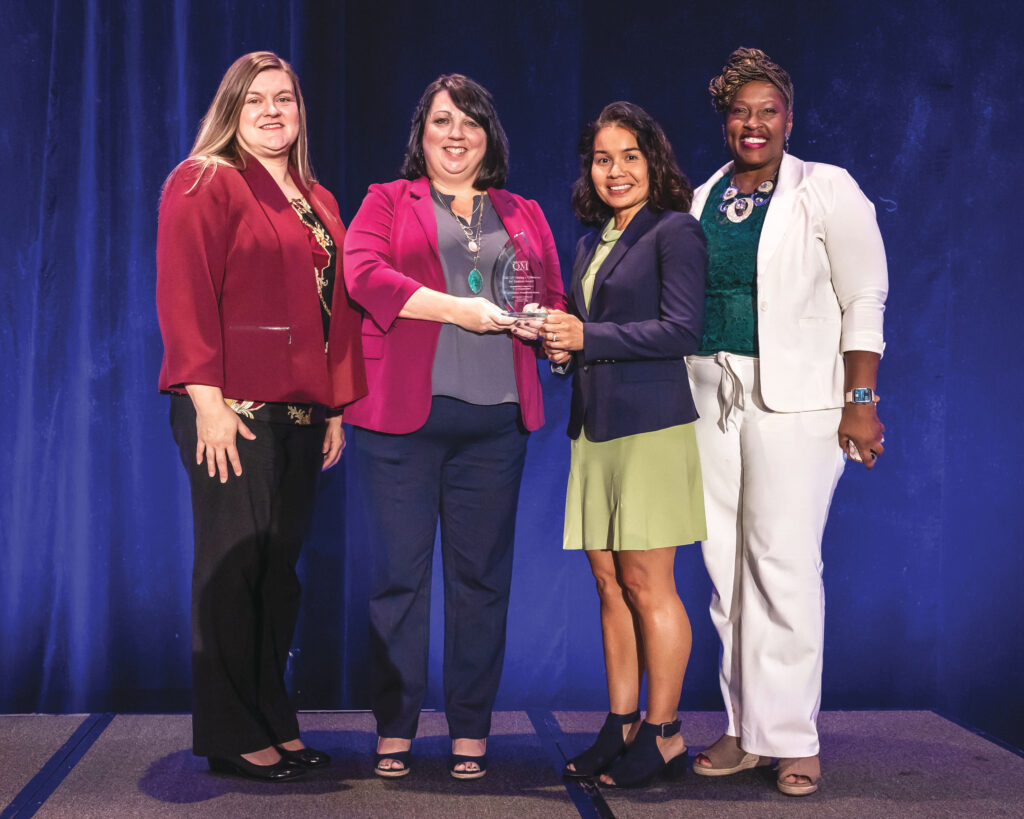Article:
Going—Virtual—to School
North Carolina online academic programs gain popularity
BY JANICE LEWINE
When Alex Kocsis was in third grade, the onset of the COVID pandemic forced him and countless students across the country into a remote learning environment to stem the infection rate. Teachers quickly pivoted to creating effective experiences for their students, who adjusted to a new way of learning.
While the transition to online classroom instruction didn’t serve every student well, Kocsis thrived. “By learning at home in a relaxed environment, I was able to focus on my academics better. I really liked how easy it was to find friends with similar interests online,” he says.
Virtual learning, which saw dramatic upticks in 2020 when the pandemic took hold, has existed for over two decades and has become the fastest-growing market in the education industry with a 900% growth rate globally since the year 2000. Further research by Global Industry Analysts indicates that the U.S. market was worth $100 billion in 2022, making it the largest in the world.
This model of education offers students multiple benefits, such as convenience, flexibility, more time to pursue outside interests, reduced commute time, and personalized learning through individualized teaching models.
North Carolina offers several virtual institutions—including private, public and charter—for students who prefer remote learning. Here, we take a look at two that are experiencing significant growth while remaining dedicated to student success.
Private Virtual Options
Coast to Mountains Preparatory Academy is an online private school that opened in March 2023, serving North Carolina students in grades K–11 (grade 12 will be added for the 2024–2025 school year).
The college and career preparatory academy aims to set students up for success through tailored offerings like small group instruction, personalized support, flexible schedules to meet each family’s needs, and opportunities to socialize with other students. The curriculum was designed by Stride, a learning company in operation for 25 years.
“We really cater to individualized learning. Our teachers have low student-to-teacher ratios. They offer small groups and 1-to-1 sessions, and really focus on what students need throughout the day,” says Vicky Creasy, Ed.D., principal of Coast to Mountains Preparatory Academy and an educator for over 20 years—half of those with Stride K12–powered schools. “We also know that socialization is important, so we have 12 very active clubs, a K12 Zone (similar to a Minecraft world) to meet others during their lunch hour and after school, and in-person events.”
Live class sessions with certified instructors, who receive enhanced training to teach online, take place through a virtual classroom platform Tuesdays through Thursdays from morning until mid-afternoon, when students take part in clubs or meet individually with their teachers.
Courses are asynchronous; students attend live sessions but complete the coursework on their own time. Mondays are reserved for assemblies and for catching up on work, while Fridays offer social hour and games in the morning, with clubs in the afternoon.
Upon enrolling at Coast to Mountains Prep, students in need of a laptop computer receive one. All students are sent the required materials for classroom activities, such as science experiments. “They do the experiments together, breaking out in small groups,” Creasy explains. “They’re also sent workbooks and textbooks, and they’re writing papers using paper and pen,” which alleviates concern about students getting too much screen time. For a course like P.E., students record themselves doing various sports or physical activities, such as a volleyball serve or jumping jacks, and upload the video for their teacher to grade.
Parents are apprised of their child’s educational progress through a parent portal, and teachers are available each day to offer students additional support.
A big advantage of distance education is that students can participate in sessions wherever they are—at home, across the country or even abroad. “Anywhere you can have your computer and Wi-Fi, you’re still able to learn,” Creasy says. As with many virtual learning classes, those at Coast to Mountains Preparatory Academy are recorded, so students who are absent can watch a session later and complete the coursework.
The flexibility appeals to Kocsis and his family, who traveled to Canada for three weeks last fall. “They have all the reading and book materials in the K12 app, so I was able to keep up with my studies,” he says. The seventh grader adds that before enrolling at Coast to Mountains Preparatory Academy, “I didn’t like science or math very much, but the teachers at this school really made me change my mind because of how the classes are taught and how the instructions and assignments are structured. I like the smaller class sizes, and I’m able to pay attention better because I’m not in the back of a classroom. Even students who are very shy can easily express ideas, communicate with their teachers and be an important part of the classroom setting.”
Kocsis advises that for students to succeed in an online learning environment, they should enjoy spending time on a computer, possess good time management skills and not mind being physically apart from their classmates. And they should really want to study virtually.
Tuition at Coast to Mountains Preparatory Academy ranges from $6,000–$6,500 a year; however, the majority of students receive NC Opportunity Scholarships, which help families pay tuition and fees. Learn more at cmprep.k12.com.

Public Virtual Options
North Carolina Virtual Public School (NCVPS) is North Carolina’s state supplemental program and a leader in online education, providing inclusive learning opportunities for middle and high school students (grades 6–12) across the state. NCVPS, which opened in 2007, enjoys a strong commitment to ensuring quality distance education for all students, regardless of location or economic circumstance.
Courses are free to those who enroll through their local North Carolina school and are available to home-school and private school students for a small fee. NCVPS reports grades back to schools for them to put the grades on report cards and transcripts, and their school awards credit. Enrollment with NCVPS is a school/district decision.
Students can remain in their local school and still take the necessary courses to complete their middle or high school studies. NCVPS offers quality courses in many subject areas, including mathematics, science, English language arts, social studies, arts and more than 135 additional courses as a supplement to the local middle and high school course catalog. It consists of six programs: Standard, Occupational Course of Study, Co-teaching, English Language Learners, and Middle School. The curriculum includes 16 advanced placement options, 18 world languages (including Mandarin, Russian, Arabic and German), and 13 career and technical education pathways.
NCVPS offers every course to graduate with both of the NC diploma tracks, as well as many courses that local schools do not have the capacity to offer in their catalogs. “The success of our program is a result of remaining student-centered and cultivating an environment focused on continuous improvement and responding to stakeholder needs. We have triumphed in fostering personalized learning, empowering students and ensuring academic success beyond traditional boundaries,” says NCVPS Executive Director Mia Murphy, Ed.D.
NCVPS enrolls for the full school year, the fall or spring semester block, and the summer block. It also accepts transfer students throughout each semester. With about 32,000 students and an average class size of 25, NCVPS boasts enrollments from all 115 school districts, 117 charter schools and 240 home and private schools. Nonpublic (home and private) schools account for 1.5% of its enrollment totals.
All NCVPS instructors are certified to teach in North Carolina and are required to have met the standard established by the North Carolina Department of Public Instruction before they can apply to teach with NCVPS. Prospective teachers must successfully complete an 18-week program consisting of nine weeks of online training followed by a nine-week practicum (a student teaching experience). Educators provide strategies for active student engagement through a variety of technology tools, and are required to make personal contact with students and parents regularly to maximize the student-teacher relationship.
“Our highly skilled and dedicated educators are the main ingredient to ensuring students succeed and flourish,” Murphy says. To help students stay on track to successfully complete a course, which is primarily designed to be completed asynchronously (outside of a set class time), teachers assign due dates and provide pacing suggestions. For the high school health and physical education course that meets the state’s graduation requirement, students are expected to have access to P.E. equipment and must submit videos to their teacher demonstrating their completion of the activity requirements.
As one of the largest state-led virtual schools in the U.S., NCVPS prioritizes quality education. The school proudly holds the record for the highest number of Quality Matters–certified courses among K–12 institutions, a rigorous review process designed to certify the quality of online and blended courses; and NCVPS earned the esteemed QM Making a Difference for Students Award in 2022. Learn more at ncvps.org.
We live in a time where in-person instruction doesn’t always provide the best fit for students; however, private and public virtual education options can help fill the gap and keep students engaged. It also prepares students for online classes at colleges, universities and trade schools, where they are sure to encounter them.


